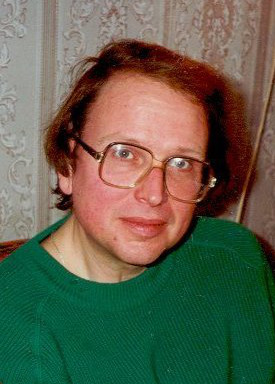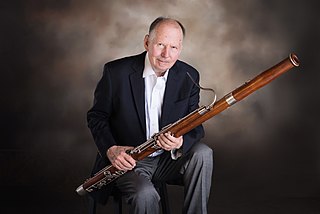Related Research Articles
A concerto is, from the late Baroque era, mostly understood as an instrumental composition, written for one or more soloists accompanied by an orchestra or other ensemble. The typical three-movement structure, a slow movement preceded and followed by fast movements, became a standard from the early 18th century.

Emmanuel Pahud is a Franco-Swiss flautist.

Edison Vasilievich Denisov was a Russian composer in the so-called "Underground", "alternative" or "nonconformist" division of Soviet music.

David Geringas is a Lithuanian cellist and conductor who studied under Mstislav Rostropovich. In 1970 he won the gold medal at the International Tchaikovsky Competition. He also plays the baryton, a rare instrument associated with music of Joseph Haydn.

Piano Concerto No. 2 in F major, Op. 102, by Dmitri Shostakovich was composed in 1957 for the 19th birthday of his son Maxim, who premiered the piece during his graduation concert at the Moscow Conservatory. It contains many similar elements to Shostakovich's Concertino for Two Pianos: both works were written to be accessible for developing young pianists. It is an uncharacteristically cheerful piece, much more so than most of Shostakovich's works.

Yuri Sergeyevich Kasparov is a Russian composer, music teacher and a professor at the Moscow Conservatory where he had studied for his doctorate under Edison Denisov. Under the patronage of Denisov, he founded the Moscow Contemporary Music Ensemble in 1990 and is its artistic director. He is the chairman of the Russian section of the International Society for Contemporary Music.
Shmuel Ashkenasi is an Israeli violinist and teacher.
John Miller is a musician and bassoonist.
Milan Turković is an Austrian classical bassoonist and conductor. He originates from an Austro-Croatian family, grew up in Vienna and became internationally known as one of the few bassoon soloists. Over the past two decades, he has become a successful conductor, making appearances all over the world.

Thom de Klerk . Dutch bassoonist, double reed maker, music teacher, conductor and music director. Thom de Klerk was the first solo bassoonist of the Royal Concertgebouw Orchestra from 1935 until 1966. He was successful with the directors Willem Mengelberg, Eduard van Beinum and Bernard Haitink. Guest directors like Eugen Jochum, Arturo Toscanini and Pierre Monteux made special requests for his presence in the orchestra.
Gustavo Núñez is a Uruguayan bassoonist trained at Musikhochschule Hannover and the Royal College of Music. He has served as principal bassoon of the Royal Concertgebouw Orchestra, together with Ronald Karten, since 1995.
Jacques Zoon is a Dutch flutist.

Alexander Ivashkin, was a Russian cellist, writer, academic and conductor.
Lyndon Jeffrey Frank Watts is an Australian bassoonist. He is principal bassoonist of the Münchner Philharmoniker and an academic teacher.
Rino Vernizzi was an Italian bassoonist.
French composer André Jolivet wrote his Concerto for Bassoon, String Orchestra, Harp and Piano in 1953–1954. It was premièred on 30 November 1954 by Maurice Allard and the Orchestre Radio-Symphonique, Paris.
Anna Tsybuleva is a Russian classical pianist. She won the Leeds International Piano Competition in 2015. As of 2022, she has released two recordings, including a performance of the Brahms Piano Concerto no. 2 with the Deutsches Symphonie-Orchester Berlin.
Bram van Sambeek is a Dutch bassoon soloist and teacher.
The bassoon repertoire consists of pieces of music composed for bassoon as a principal instrument that may be performed with or without other instruments. Below is a non-exhaustive list of major works for the bassoon.

Robert Thompson is an American bassoonist.
References
- 1 2 3 4 5 6 7 8 9 William Waterhouse (20 January 2001). "Popov, Valery (Sergeyevich)". Grove Music Online doi : 10.1093/gmo/9781561592630.article.22110
- ↑ In Memoriam: Sergei Petrovich Popov (1914–2012), International Trumpet Guild (accessed 20 May 2022)
- 1 2 3 4 5 6 7 8 9 10 11 Valery Popov: Curriculum Vitae, Moscow State Conservatory (accessed 19 May 2022)
- 1 2 Gerard McBurney (18 May 2022). Vladislav Shoot obituary, The Guardian (accessed 18 May 2022)
- ↑ Maria Metaxakis (1998). Centre Acanthes: Russian Music. Tempo 206: 63 JSTOR 945521
- ↑ David Schwartz (2014). "Vivaldi: Bassoon Concertos (5)." American Record Guide 77 (5): 178–79
- ↑ Carter (1995). "Bassoon Concertos". American Record Guide 58 (1): 217
- ↑ Donald Vroon (2008). "Mozart's Concertos". American Record Guide . 71(3): 49–63
- ↑ Phillip Scott (2015). "Concerto for Flute and String Orchestra1. Cello Concerto No. 22. Bassoon Concerto3. Piano Concerto4. Symphony No. 15. 5 Ritual Dances5. Rhapsody for Seven6". Fanfare , 38 (5): 267–68
- ↑ Don O'Connor (2015). "Jolivet: Flute Concerto; Cello Concerto 2; Bassoon Concerto; Piano Concerto; Symphony 1; 5 Ritual Dances; Rhapsody for 7". American Record Guide 78 (2): 109
- ↑ Ronald E. Grames (2014). Katarzyna Zdybel: Portrait. Fanfare 38 (2): 649–50